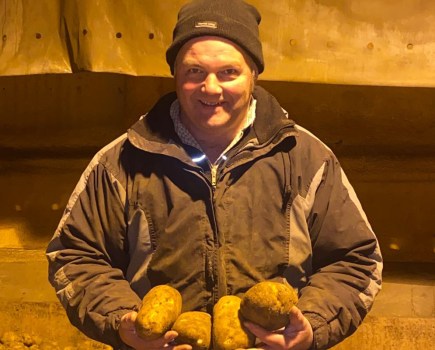 For many people 2020 will have been an ugly year. Life as we know it has changed as we live alongside a viral threat that’s touched everyone in many different ways. But alongside the global turmoil, the impact of a changing climate has been felt across the world – from raging wildfires to rain that just didn’t seem to know when to stop. For those making a living from the land it’s been particularly grim.
For many people 2020 will have been an ugly year. Life as we know it has changed as we live alongside a viral threat that’s touched everyone in many different ways. But alongside the global turmoil, the impact of a changing climate has been felt across the world – from raging wildfires to rain that just didn’t seem to know when to stop. For those making a living from the land it’s been particularly grim.
One of the blessings in agriculture is that when one sector is having a hard time, another is doing okay. That means risk can be spread across different enterprises and crops. That wasn’t the case in 2020. Combinable crops mostly came off at well below average yields and sugar beet has been plagued by virus yellows – it was a bad season.
Where virus yellows pressure was highest, yield losses as high as 70% have been reported. And with the depression in sugar content that also comes with virus, it spells a financial disaster. The threat from viruses is a very real one, made all the more so by aphid control measures that have been found lacking in a season such as this. 2020 is the year viral diseases look set to change the landscape, perhaps literally as some sugar beet growers are understandably reconsidering their cropping options.
If aphids are going to thrive as the climate warms then perhaps there’ll prove to be a way to rub along with them a bit better. In this issue we’ve explored some of the innovation that’s happening on UK farms, which illustrates that the most pressing problems can be surmounted by grass roots experimentation and broader thinking. These are things that will be needed to cope with a changing climate, where the solution to the threats posed is unlikely to come out of a bottle.
One of the good things that’s come out of the ‘year of the virus’ is that there’s no shortage of food for thought. The connectivity across the world, the sharing of ideas and the availability of information has never been better. This was illustrated by keynote speaker at AHDB’s virtual Potato Industry Conference last month. Brendon Rockey farms potatoes in Colorado and has changed his farming system to one he describes as biotic – based on living organisms – from one that was farmed conventionally using ‘cides’ to kill pests, weeds and pathogens. In his own words he was “replacing death with life.”
As a potato seed grower Brendon’s early approach was to use aphicides to control virus, but he realised that also killed the beneficials, which resulted in using more ‘cides’. It dawned on him that in order to keep the few harmful weeds, pests, pathogens under control, he was killing most of the beneficial organisms and concluded it was a destructive system. Brendon believes that the ‘cides’ he was using were affecting the microbiology, which in turn affects the carbon cycle and leads to the depletion of soil structure – resulting in poor levels of gaseous exchange and water infiltration and holding capacity.
Now he concentrates on maintaining a healthy fertile soil to nurture soil biology and he’s moved away from absolute monoculture by planting a companion crop with his potatoes – planting legumes such as faba beans, chickpeas, field peas with buckwheat – and he also divides fields with flowering strips as a food source for beneficials.
The system relies on carefully selected cover crops, with legumes to help enrich the soil with nitrogen and buckwheat to help mobilise phosphate. He plants species with long tap roots to bring nutrients up from depth for the following crop of potatoes to utilise.
These are just some of the techniques Brendon uses in his biotic system but he’s now able to produce comparable yields of potato seed (on a two-year rotation) without virus, something he attributes to the multiple living tools he’s using but also to the systemic acquired resistance of his potato crop – healthy plants can defend themselves against aphid attack.

It’s a challenging concept that the very inputs relied upon to produce most crops may be disadvantageous, and it’s one that doesn’t sit comfortably with some but rings completely true to others. There’s plenty more thought-provoking content available online to help keep the brain cogs turning. A tsunami of webinars and online conferences that have replaced meeting up in person and keeping track of what’s on can be befuddling. Thankfully webinag.co.uk has compiled a diary, which may prove useful over the coming winter months.
Based in Ludlow, Shrops, CPM technical editor Lucy de la Pasture has worked as an agronomist. @Lucy_delaP




